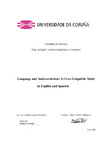Mostrar o rexistro simple do ítem
Language and Androcentrism: A Cross-Linguistic Study in English and Spanish
| dc.contributor.advisor | Lezcano, Emma | |
| dc.contributor.author | Loureiro Rodríguez, Brais | |
| dc.contributor.other | Universidade da Coruña. Facultade de Filoloxía | es_ES |
| dc.date.accessioned | 2023-11-29T07:56:37Z | |
| dc.date.available | 2023-11-29T07:56:37Z | |
| dc.date.issued | 2022 | |
| dc.identifier.uri | http://hdl.handle.net/2183/34363 | |
| dc.description.abstract | [Abstract] Patriarchy is a social order that has pervaded all aspects of our socialization, including language. Aiming at preserving the male-dominated status quo, languages have been constructed from an androcentric viewpoint which reinforces women’s subalternity in the non-linguistic realm. This paper thus endeavors to shed light on women’s linguistic situation and the societal impact of linguistic sexism. To attain this, in the first place, I examine the question of language and androcentrism. As can be seen, languages undergo a male-biased process of acculturation which results in them absorbing, shaping into and reflecting the patriarchal social order. In the second place, I draw upon Deutscher’s (2011) theory on linguistic relativism, which purports that linguistic patterns can eventually become mind habits—i.e. language influences memory, perception, associations, etc. Therefore, in being androcentrically constructed, language makes the perfect means to reinforce our binary interpretation of the world. Thirdly, I delve into what I consider to be the three possible main pillars of linguistic sexism. This part thus explores (1) the dictionary as a male-biased object that shapes usage and discourse, (2) sexist expressions in English and Spanish and their power to render the masculine normal and the feminine abnormal, and (3) the generic masculine and the tendency to dissolve the feminine into the masculine, which demonstrates that the hierarchical relationship “Man v. Woman” that exists culturally is echoed grammatically. Moreover, due to its current popularity with the youth, special attention is given to the singular use of they. Lastly, I put forth a cross-linguistic analysis of nursery rhymes and canciones infantiles to add a fourth pillar to what I have considered to be, along with the other three, the stronghold of linguistic sexism. To carry out this analysis, the songs have been grouped thematically into “Gender violence”, “The Domestic Realm”, “Objectification”, and “Gender Identity”. In so doing, I aim to illustrate how the binarism “Men v. Women” and androcentrism are instilled in children by means of language. As a result, the literature review and the cross-linguistic analysis carried out in this paper evidence that the male elites have historically strived to turn language into a male-dominated instrument, thereby weaponizing its influence over our cognitive processes to perpetuate women’s subjugation to men. Ultimately, my intention is for this paper to raise awareness of a subtle, underestimated type of sexism which grows stronger the less people know about it. | es_ES |
| dc.language.iso | eng | es_ES |
| dc.rights | Os titulares dos dereitos de propiedade intelectual autorizan a visualización do contido deste traballo a través de Internet, así como a súa reproducción, gravación en soporte informático ou impresión para o seu uso privado e/ou con fins de estudo e de investigación. En nengún caso se permite o uso lucrativo deste documento. Estos dereitos afectan tanto ó resumo do traballo como o seu contido Los titulares de los derechos de propiedad intelectual autorizan la visualización del contenido de este trabajo a través de Internet, así como su repoducción, grabación en soporte informático o impresión para su uso privado o con fines de investigación. En ningún caso se permite el uso lucrativo de este documento. Estos derechos afectan tanto al resumen del trabajo como a su contenido | es_ES |
| dc.subject | Androcentrism | es_ES |
| dc.subject | Patriarchy | es_ES |
| dc.subject | Linguistic sexism | es_ES |
| dc.subject | Linguistic relativism | es_ES |
| dc.subject | Feminism | es_ES |
| dc.title | Language and Androcentrism: A Cross-Linguistic Study in English and Spanish | es_ES |
| dc.type | info:eu-repo/semantics/bachelorThesis | es_ES |
| dc.rights.access | info:eu-repo/semantics/openAccess | es_ES |
| dc.description.traballos | Traballo fin de grao (UDC.FIL). Inglés: estudios lingüísticos y literarios. Curso 2021/2022 | es_ES |






